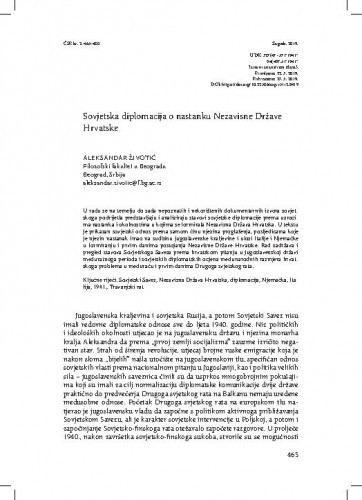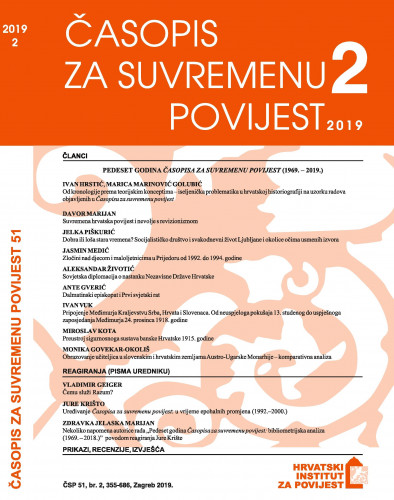U radu se na temelju do sada nepoznatih i nekorištenih dokumentarnih izvora sovjetskoga podrijetla predstavljaju i analiziraju stavovi sovjetske diplomacije prema uzrocima nastanka i okolnostima u kojima se formirala Nezavisna Država Hrvatska. U tekstu je prikazan sovjetski odnos prema samom činu njezina proglašenja, posljedicama koje je njezin nastanak imao na sudbinu jugoslavenske kraljevine i ulozi Italije i Njemačke u formiranju i prvim danima postojanja Nezavisne Države Hrvatske. Rad sadržava i pregled stavova Sovjetskoga Saveza prema hrvatskom pitanju u jugoslavenskoj državi međuratnoga perioda i sovjetskih diplomatskih ocjena međunarodnih razmjera hrvatskoga problema u međuraću i prvim danima Drugoga svjetskog rata.; During the interwar period, in the climate of a lack of regular diplomatic relations between the Yugoslav kingdom and Soviet Russia/the USSR, the Soviet side came to see the Yugoslav state as an artificial creation that needed to be destroyed. Later, the stance that the Yugoslav state needed to be reconstituted on a federal basis became more accepted. Despite a series of attempts to normalise interstate relations, a series of controversies, one of the most important being the Soviet stance towards the national question in Yugoslavia, resulted in a lack of regular diplomatic communication between the two states. After long negotiations, official diplomatic relations were established in summer 1940. The most influential Croatian political party – the Croatian Peasant Party led by Vladko Maček – supported the Yugoslav rapprochement with the USSR, seeing in it a sort of counterbalance to aggressive Italian policy towards the Balkans. The Soviet side saw Croatian-Serbian relations – the backbone of the Yugoslav state – as deeply conflicting interests of two opposed bourgeoisies that maintain their political monopoly through compromises and agreements and thus oppose the revolutionary strivings of the working people. They believed that Italy, and especially Germany, would try to use the deep-rooted contradictions between the Serbian and Croatian national bodies in the Yugoslav state in order to destabilise it from within. Soviet diplomacy was convinced that Germany would try to convert Croatia into a starting point for spreading its influence in the Yugoslav lands. They anticipated that, instead of the Croatian Peasant Party, the Axis forces would place their trust in the Ustasha movement and entrust its leader, Ante Pavelić, to lead an independent Croatian state, which would in fact be a puppet state similar to Slovakia.
Sažetak

 Časopis za suvremenu povijest : 51,2(2019) / glavni i odgovorni urednik, editor-in-chief Zdravka Jelaska Marijan.
Časopis za suvremenu povijest : 51,2(2019) / glavni i odgovorni urednik, editor-in-chief Zdravka Jelaska Marijan.